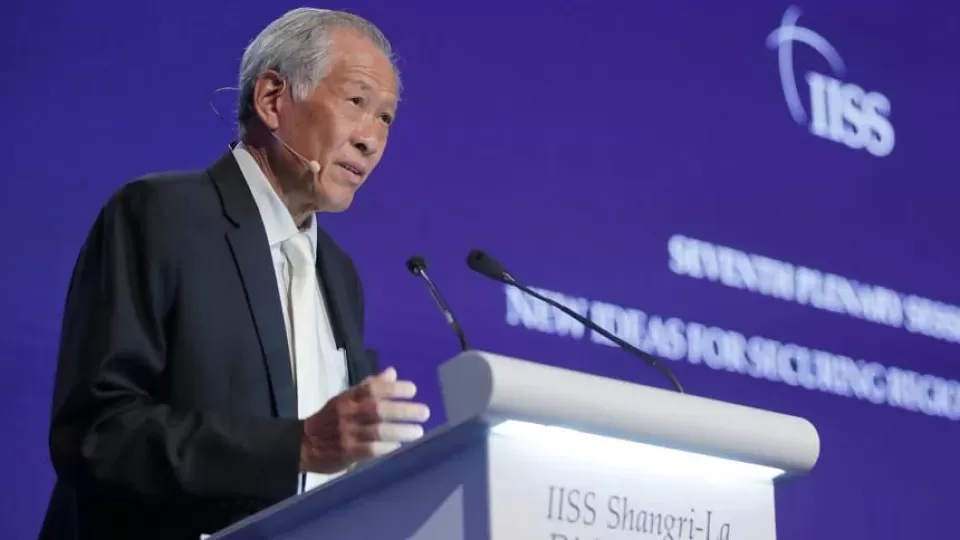June 13, 2022
SINGAPORE – Asean states will take comfort from the fact that defence leaders of the United States and China met at the Shangri-La Dialogue, with both separately saying they are not compelling the region to take sides.
Both countries have said there is no need to choose, and that they do not want Asean states to choose, said Singapore’s Defence Minister Ng Eng Hen.
“Whether that is the reality, I think only the facts will speak for themselves,” he told reporters on Sunday (June 12) at the end of the summit.
Dr Ng was responding to a question on South-east Asian countries’ reaction to statements by US Defence Secretary Lloyd Austin and Chinese Defence Minister Wei Fenghe, who were both headline speakers at the three-day defence summit.
Dr Ng noted that Asean countries would take comfort that both defence leaders had their first in-person meeting in Singapore, notwithstanding American reservations that the level of representation from the Chinese side was not at the right level.
Mr Austin had previously asked to hold talks with General Xu Qiliang, vice-chairman of China’s Central Military Commission.
Dr Ng said: “But the very fact that both defence ministers met, it did give some comfort.
“Because you have to, in that sense, know your competitor or antagonist physically – that would give you a proper measure of the man. So I think that was reassuring.”
While it is a stretch to suggest that one meeting has improved US-China relations – one of the themes at the Shangri-La Dialogue – it might give pause to both sides as they work out their differences, said Dr Ng.
Asean countries will continue to work within the Asean Defence Ministers’ Meeting-Plus (ADMM-Plus) dialogue to be held at the end of this year, where China and the US will again be present.
“This is a conversation, this is a journey. This is the reality and that would be how I would characterise it, there is no summative experience or summative conclusion.
“It’s just too complex a problem. The Cold War took a good part of 50 years, so why should we expect this to be resolved within a couple of decades?” said Dr Ng.
In his 30-minute interview, Dr Ng took questions ranging from whether it was the right decision for Russia not to be invited, and a possible expansion of the ADMM-Plus to include more European dialogue partners.
Both France and Canada’s defence ministers had reiterated, in speeches made at the Shangri-La Dialogue, their countries’ desire to be part of the 18-member grouping.
The ADMM-Plus consists of Asean, Australia, China, India, Japan, New Zealand, South Korea, Russia and the US.
Including both as observers was something Asean defence ministers agree on in principle, but Dr Ng said more work needs to be done.
“We are at the stage where you have to work out how, and how do you digest this. You don’t want to have indigestion or in practical terms, where you’re a member and there’s no activity, and that’s not what we’re after,” he said.
As early as in 2013, France had expressed its wish to participate in the activities of the ADMM-Plus. Canada has also appealed on previous occasions.
As to how Singapore is advancing its own capabilities following the Dialogue, Dr Ng pointed to agreements that the Singapore defence establishment signed with its counterparts, including with South Korea, France and China.
An agreement signed on Friday with South Korea aims to enhance cooperation between defence media agencies in defence content production, media technology, and industry partnerships.
One area of focus is in strategic communications, said Dr Ng, adding that the idea is to teach Singapore’s Ministry of Defence and Singapore Armed Forces communications teams how to produce K-pop, to reach out to audiences.
“So we go to a military that has got strengths, and then we want to learn from them,” he said.
Other agreements signed include a mutual logistics support arrangement with France, and one with China to allow more professional exchanges between military officers.
On whether Russia should have been invited, Dr Ng said it was understandable given the proximity of the Ukraine invasion.
But he added that there were practical issues, such as other participants walking out should Russia attend.
This year’s Shangri-La Dialogue was valuable, with the pent-up desire to meet physically, he said.
“The constant refrain was that nothing replaces face-to-face meetings. That’s always true, especially for diplomacy.”
The right questions were also being asked about how the Ukraine invasion affects this part of the world, and the lessons that should be learnt.
Even though Ukraine is, as its President Volodymyr Zelensky said during a special address at the summit, fighting for principles for the rest of the world, principles alone were insufficient, said Dr Ng.
“What you need to do is, as President Zelensky said, preemption. How do you prevent the situation from getting to conflict because once conflict occurs, it’s too late.”
“And the basic lesson is that you have to build, use this time of peace in Asia to build trust, strategic trust and confidence, if you want to stay very far away from the line of conflict.
“So I think those aspects, in and of themselves, make the Shangri-La Dialogue valuable,” said Dr Ng.

